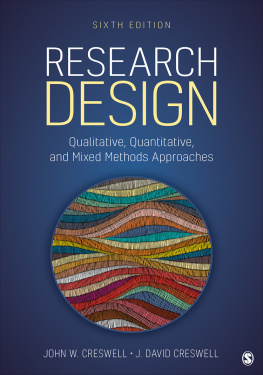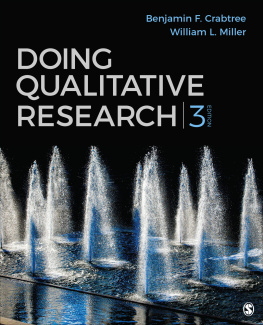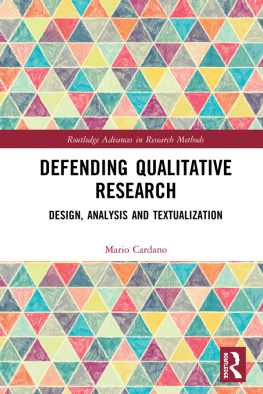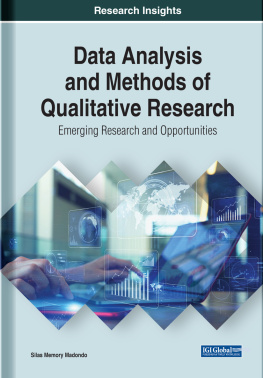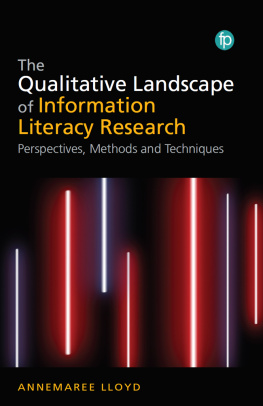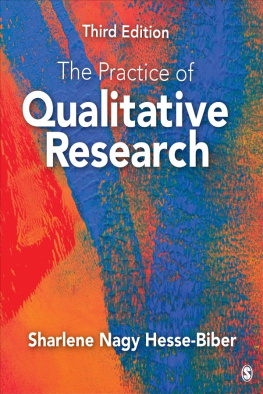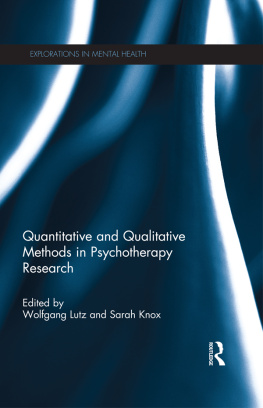Qualitative GIS
Qualitative GIS
A Mixed Methods Approach
EDITED BY
Meghan Cope and Sarah Elwood

and Editorial arrangement Meghan Cope and Sarah Elwood 2009
Marianna Pavlovskaya 2009
Nadine Schuurman 2009
Sarah Elwood 2009
Jon Corbett and Giacomo Rambaldi 2009
LaDona Knigge and Meghan Cope 2009
Jin-Kyu Jung 2009
Stuart C. Aitken and James Craine 2009
Matthew W.Wilson 2009
First published 2009
Apart from any fair dealing for the purposes of research or private study, or criticism or review, as permitted under the Copyright, Designs and Patents Act, 1988, this publication may be reproduced, stored or transmitted in any form, or by any means, only with the prior permission in writing of the publishers, or in the case of reprographic reproduction, in accordance with the terms of licences issued by the Copyright Licensing Agency. Enquiries concerning reproduction outside those terms should be sent to the publishers.
SAGE Publications Ltd
1 Olivers Yard
55 City Road
London EC1Y 1SP
SAGE Publications Inc.
2455 Teller Road
Thousand Oaks, California 91320
SAGE Publications India Pvt Ltd
B 1/I 1 Mohan Cooperative Industrial Area
Mathura Road, Post Bag 7
New Delhi 110 044
SAGE Publications Asia-Pacific Pte Ltd
33 Pekin Street #02-01
Far East Square
Singapore 048763
Library of Congress Control Number 2008939920
British Library Cataloguing in Publication data
A catalogue record for this book is available from the British Library
ISBN 978-1-4129-4565-3
ISBN 978-1-4129-4566-0 (pbk)
Typeset by C&M Digitals (P) Ltd, Chennai, India
Printed by in India at Replika Press Pvt Ltd
Printed on paper from sustainable resources
CONTENTS
Sarah Elwood and Meghan Cope
Marianna Pavlovskaya
Nadine Schuurman
4 Multiple representations, significations,
and epistemologies in community-based GIS
Sarah Elwood
5 Geographic information technologies,
local knowledge, and change
Jon Corbett and Giacomo Rambaldi
LaDona Knigge and Meghan Cope
Jin-Kyu Jung
Stuart Aitken and Jim Craine
Matthew W. Wilson
Meghan Cope and Sarah Elwood
NOTES ON CONTRIBUTORS
Stuart Aitken is Professor of Geography at San Diego State University, where he is also the director of the Center for Interdisciplinary Studies of Youth and Space; and an Adjunct Professor in the Department of Geography at the National Technical University of Norway. His research interests include film and media; children, families, and youth; critical visual approaches in GIS; and qualitative and poststructural methods in geography. Stuart has published widely in academic journals in urban and social geography and GIS, and is the author or editor of multiple scholarly texts contributing to social geography and research methodologies in geography. He is currently the North American editor of Childrens Geographies.
Meghan Cope is an Associate Professor in the Geography Department at the University of Vermont in Burlington, Vermont, USA. Her research interests are in the local experiences and constructions of place among marginalized social groups of North American and European cities. Most recently, Meghan has been working on research with young people through the Childrens Urban Geographies project. She has also published widely on qualitative research methods and combines this with an interest in critical GIS to engage in new conceptual and practical developments, particularly through work with students.
Jon Corbett is an Assistant Professor in the Community, Culture and Global Studies Unit at UBC Okanagan, British Columbia, Canada. Jons community-based research investigates cartographic processes and tools that are used by communities to help express their relationship to, and knowledge of, their territories and resources. Jon has worked with indigenous communities in Australia, Indonesia, and the Philippines, and since 2004 with several First Nations communities in British Columbia. Recently Jon has been working with the United Nations International Fund for Agricultural Development in Albania, Kenya, Mali, and Sudan.
Jim Craine is an Assistant Professor in the Department of Geography at California State UniversityNorthridge, California, USA. Recent research includes work on affective geovisualization and emotional cartographies. He is also a co-editor of Aether: The Journal of Media Geography.
Sarah Elwood is an Associate Professor in the Department of Geography at the University of Washington, in Seattle, Washington, USA. Her research interests intersect critical GIS, urban political geography, qualitative methods, and participatory action research. In teaching, her contributions include developing curricula for incorporating participatory and community-engaged research into undergraduate GIS education. Most recently, Sarah has been working on a collaborative research, teaching, and community outreach project that focuses on the use and impacts of geographic information systems and GIS-based spatial knowledge in neighborhood revitalization and in urban planning and problem solving.
Jin-Kyu Jung is an Assistant Professor in the Department of Geography at the University of North Dakota, USA. His main academic interests are in GIS and qualitative research, community studies, critical urban geography and planning, and mixed methods research. He has been conducting research on how to more fully integrate qualitative and quantitative approaches in mixed methods research with GIS, most recently through two case studies involving childrens and adults perceptions of their neighborhoods in Buffalo, NY. Exploring further applications of qualitative GIS as an analytical framework to study diverse urban issues is his long-term research goal.
LaDona Knigge is an Assistant Professor in the Department of Geography and Planning at California State UniversityChico, California, USA. Her interests include community gardens, public space, qualitative GIS, and local food systems, with particular emphasis on fostering and promoting civic agriculture and relocalizing food systems in ways that build both community and economic and ecological sustainability.
Marianna Pavlovskaya is an Associate Professor in the Department of Geography at Hunter College and in CUNY Graduate Center, in New York, USA. Her research focuses on the constitution of class and gender in postsocialist Moscow and New York City, rethinking neoliberal transition in Russia, and critically rereading geospatial technologies. She uses GIS in qualitative and quantitative research projects and is interested in its effects as a particular and very powerful representational tool.
Giacomo Rambaldi is senior programme coordinator at the Technical Center for Agricultural and Rural Cooperation (CTA) in The Netherlands. He has 26 years of professional experience in developing countries where he worked for a number of international organizations. Giacomo has been promoting good practice in the domain of community mapping via various channels including his websites www.iapad.org and www.ppgis.net. Areas of professional interest include visualizing indigenous spatial knowledge for improving communication, facilitating peer-to-peer dialog, and managing territorial conflicts; collaborative natural resource management; participatory spatial planning; networking; and web publishing.


